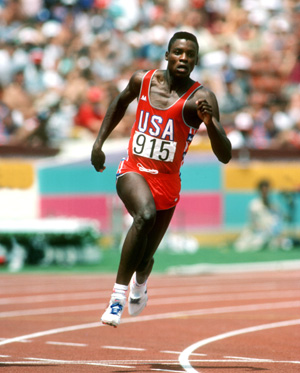 |
| AP Photo |
One of the most renowned Olympic athletes of all time, Frederick ‘Carl’ Lewis, was born July 1, 1961 in Birmingham, Alabama. The third of four children, Carl was born into a family of athletic prowess. His parents both attended Tuskegee Institute—his mother, Evelyn, was a world-class hurdler who took part in the 1951 Pan-American Games—and his father, Bill, ran track and was a football player. [1] Evelyn and Bill raised their four children in Willingboro Township, New Jersey, where they operated the Willingboro Track Club. Created in 1969, the Willingboro Track Club was a local athletic club in which over 3,000 youngsters competed in, including several all-America athletes and national record-holders. [2]
At age 13, Lewis began competing in
the long jump. He endured an erratic (and painful) growth spurt at age 15, gaining
two and a half inches in a month and forcing him into crutches until he
adjusted to his extreme body changes.[3] He
was a dominant force in track and field in his days at Willingboro High, where
his long-jump mark of 26-8 (26 feet, 8 inches) set a prep school record. [4] By
the time he graduated, Lewis was the top-ranked high school track athlete in
the country.
With the chance to be coached by Tom
Tellez, Lewis opted to attend Houston University. Tellez—who became Lewis’
coach for the remainder of the athlete’s career—adjusted the jumping technique
of his pupil to atone for his persistent knee issues.
With the United States boycotting
the 1980 Olympics in Moscow, Lewis was robbed the chance of displaying his
excellence to the world. He had to wait another four years to fulfill his
lifelong dream, but in the meantime, he continued to dominate in track. Lewis
became the No. 1 in the world in the 100 meters and in the long jump[5],
earning the James E. Sullivan Award as the top amateur athlete in the United
States. In 1983, he won the 100, 200 and long jump at the U.S. national
championships.
By the time the 1984 Los Angeles Games had rolled around, Lewis sought to mark his territory in Olympic history.
He began his pursuit of greatness by declaring that he would win four gold
medals in ’84—matching the record in one Olympic Games set by Jesse Owens in
1936. Lewis stayed true to his guarantee, winning gold in the 100 meters, 200
meters, long jump and 400-meter relay.
Lewis’ success was not met without
controversy. His cocky swagger did not mesh well with Olympic fans or the
media, who he often quarreled with. Outsiders believed Lewis cared more about
his personal brand rather than the Olympics themselves. His desire to cash in
on endorsement deals made him arguably the most polarizing figure in Olympics
history.
 |
| AP Photo |
Lewis also faced heavy criticism after not taking his final long jump in the ‘84 Olympics, sitting out a chance to set a world record because he already won the gold for the event as he refused to risk injury.
"Had I taken one more jump and injured myself, I would have been finished for the rest of the Olympics," Lewis said. "I was in the Olympics to win medals for America, not to set world records for myself."[6]
The booing at the Los Angeles
Coliseum in ‘84 did not deter Lewis or his brash attitude. In the 1988 Olympics
in Seoul, he took gold in the 100 meters and long jump—becoming the first
athlete in Olympics history to defend the title in either of the aforementioned
events. Healso won a silver medal that year in the 200 meters.
Lewis won gold in the 400-meter
relay and long jump in the 1992 Olympics, hosted by Barcelona. In his final
Olympic performance, the 35-year-old won gold in Atlanta for the long jump
competition.
An Olympic mainstay from 1984 to
1996, Lewis captured nine gold medals and one silver in four Summer Games. He
was voted Sportsman of the Century by the International Olympics Committee
(IOC) in 1999.
In assessing supremacy in Olympics,
longevity and dominance are key measuring sticks. A four-time Olympian who won
nine gold medals, Carl Lewis is the greatest track and field athlete in Olympic
history.
[1] Carl
Lewis Biography. (n.d.). In Encyclopedia
World Biography. Retrieved from http://www.notablebiographies.com/Ki-Lo/Lewis-Carl.html
[2]
Associated Press. (1987, May 7). William Lewis, Track Coach and Father of
Olympic Star. The New York Times.
Retrieved
from http://www.nytimes.com/1987/05/07/obituaries/william-lewis-track-coach-and-father- of-olympic-star.html
[3] Carl
Lewis Biography. (n.d.). In Bio. Retrieved
from http://www.biography.com/people/carl-lewis-40103
[4]
Ibid.
[5] Schwartz,
L. (n.d.). King Carl had long, golden reign. Retrieved from https://espn.go.com/sportscentury/features/00016079.html
[6] Horovitz,
B. (1988, September 13). Going for the Gold : Carl Lewis Hopes to Win Over
Madison Ave. Los Angeles Times. Retrieved from
http://articles.latimes.com/1988-09-13/business/fi-1897_1_carl-lewis